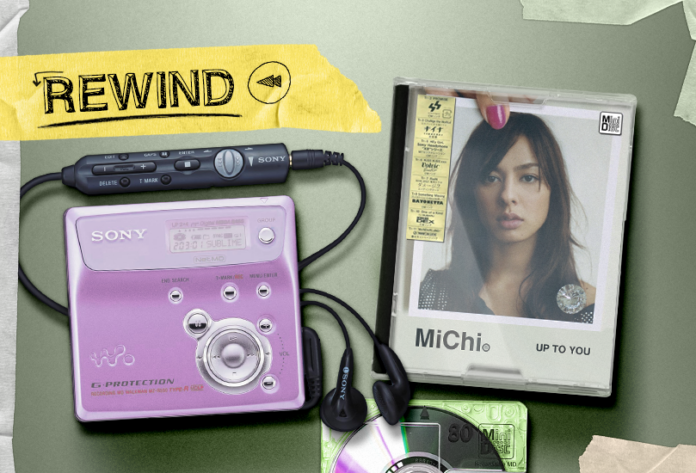Curated From randomjpop.blogspot.com Check Them Out For More Content.
30 September, 2024. Marking the 15th anniversary of MiChi’s debut album, Up To You. An album which I have listened to regularly since the day of its release.
Up to You. A timeless bitch. And a timely one.
So, let’s rewind and revisit Up to You.
Now, I’m probably gonna need to introduce MiChi. Because she wasn’t exactly a huge star and she had a pretty short career.
It was during MiChi’s club gigging that she’d cross paths with producer Tomokazu Matsuzawa, known professionally as T.O.M. With T.O.M, MiChi would record music (including her indie release), hone her craft and develop a sound. And their partnership would be one which would last MiChi’s entire career, with T.O.M producing for all three of her albums. Although he would not be anywhere near involved with her third album as he was her first and second. And lo behold, that was her weakest album, and a far cry from Up to You. But that’s a whole other post.
The partnership of MiChi and T.O.M is the nucleus of what made Up to You the album that it was / still is. Together, they created this sonic world and musical language . The same way Missy Elliott and Timbaland did. The same way Janet Jackson and Jimmy Jam & Terry Lewis did. The same way Charli XCX and A. G. Cook does. And despite T.O.M having already had production credits to his name prior to meeting MiChi, it was with MiChi that T.O.M developed a signature sound—which he has since unfortunately lost. But that’s also a whole other post.
MiChi and T.O.M were a package deal. And whilst it was a short-lived offer, it was glorious whilst it lasted. And at least we have Up to You to show for it.
%20MiChi%20-%20Up%20to%20You%20%231.png)
So, what type of album is Up to You? The easy answer is ‘It’s a pop album’. But pop as a genre is so broad. And even when it intersects with other genres to such a point that it becomes something else, it still gets filed under ‘pop’—oft due to association of the artist. Chappell Roan’s The Rise and Fall of a Midwest Princess is pop. Ariana Grande’s Eternal Sunshine is pop. You could even file Charli XCX’s Brat under pop and it wouldn’t be a completely wrong categorisation. Three albums which couldn’t be any more different from one another, with three distinctly different sounds. Yet, all still pop. So, somebody telling you an album is pop in 2024 doesn’t really tell you anything about it. And in many cases, it does albums a disservice. Pop has become so incredibly broad that…what is even pop any more? And whilst MiChi’s album Up to You is a pop album, it’s not really going out of its way to be. It’s not really trying to be much of anything.
So, to be a little more descriptive, Up to You would is a bit of a pop jukebox, something which it wears on its sleeve and makes pretty clear from the offset with its chaotic intro “MadNesS vol. 1”. But if I had to liken Up to You to an album from the past 10 years, it’d probably be Rina Sawayama’s very own debut album. Sawayama being an artist who happens to share a fair amount in common with MiChi—being British-Japanese, which undoubtedly shaped their own views of pop in Japan, the UK and America, and how they would seek to fashion it for themselves. And another common thing both artists share is their willingness to be frank and transparent about the expectations placed upon them as women through their music. And for two Japanese women to call this out is bold, when a cultural expectation for Japanese women is to not complain and just suffer in silence—which unfortunately, is how the world at large would prefer women do.
Sawayama’s debut felt like an album from a creative duo who were pop fans to a nerdy degree, and relished in playing around with the genre and bending the rules of it. Up to You is similar in that regard. The same way that Sawayama and Clarence Clarity were like ‘Fuck it, let’s just pull it all apart and have fun’, MiChi and T.O.M did the same. There were no rules. They pulled from multiple eras of pop, different types of pop, different artists within pop, and just threw it all together. There are songs on this album which sound like Avril Lavigne. There are songs which sound like the Sugababes. Songs which sound like TLC. Songs which sound like Jewel. Songs which sound like Janet Jackson. Songs which sound like Des’ree. This all sounds like some cockamamie recipe from somebody who can’t settle on a sounf, until you think of producers who have run a similar gamut of sounds successfully. Two come to mind for me—Dallas Austin and Jimmy Jam & Terry Lewis. Producers who have left their imprints on pop, whose influences carry through each generation in some form, whether people want to acknowledge it or not. And their influence certainly runs though Up to You, whether it was intentional or not.
T.O.M has this amazing ability to just dip in and out of any style and sell it, because he has an understanding of each of them—which has always been Austin’s calling card. But he also has this ear for sampling, and pulling lots of different references together to create something which sounds new and original—which is what Jam & Lewis have always done masterfully. It’s not hard to imagine a world where MiChi recorded an album with Austin and the FlyteTyme duo.
%20MiChi%20-%20Up%20to%20You%20%232.png)
Up to You released in 2009, which was a strange year in music, because there wasn’t really a dominant sound or a clear trend for everybody to follow. 2009 seemed to be the year of doing whatever-the-fuck. But it also wound up being the year of really dark and depressing pop. It was the year that Hikaru Utada released This Is the One. The Black Eyed Peas released The E.N.D. Florence + The Machine released Lungs. Calvin Harris released Ready for the Weekend. Kid Cudi released Man on the Moon: The End of Day. Paramore released Brand New Eyes. Lady Gaga released The Fame Monster. Rihanna released Rated R. 2009 was the year of ‘We lost and we depressed, but we dancin’. There was clearly something in the air in ‘09. Because this deep-heavy-sigh vibe filtered into MiChi’s Up to You—in songs such as “Why Oh Why”, “Something’s Missing” and “Shibuya de Punch”. But Up to You also acknowledged the need to remind ourselves of our power to uplift and take charge of our own destiny, something which would carry through into MiChi’s second studio album, Therapy.
2009 was a gloomy year for pop. And I think this is why Up to You really struck me, because it felt like a beacon of light amidst the depressing-ass albums everybody else was releasing. Up to You acknowledged ‘Girl, it’s rough’. But also ‘Girl, we can’t stay down here. We gotta get up and get out.’ And because of that, Up to You felt refreshing. It didn’t feel as heavy as other albums did, yet it still had substance and acknowledged that life just be doo-doo sometimes.
Whilst everybody else was trying to be cool, edgy and out brood each other, MiChi and T.O.M said ‘FUCK IT’ and just put out these bright pop songs. They set their own rules and weren’t so fixated on trying to be one thing or the other. They just made songs which felt true to them. Which is why Up to You having its 15th anniversary fall at a time when pop acts such as Roan, XCX, Olivia Rodrigo and Billie Eilish are being celebrated for just doing their own thing, being authentic to themselves and not being hung up on labels feels so fitting. And it says a lot that Roan and XCX happen to be two artists who for years never really fit in. And that when they stopped trying to play the game, the game then found a place for them. This unfortunately didn’t quite happen for MiChi. She didn’t have the look that the genre favoured. She didn’t have the sound that the genre favoured. And with the Japanese music industry being as…rigid (for the lack of a better term) as it is and valuing familiarity, MiChi was displaced. She was doing all of the right things, but in the wrong market.
But MiChi’s album releasing in 2009 is a cool reminder of how cyclical music can be. And that every generation has always had women in music who have pushed a boundary and said ‘Fuck it’, each paving a way for those who would come after them. Today people are highlighting the likes of Roan and XCX. But in 2009 there was Lady Gaga, who was clearly influenced by two notable women who came before her—Madonna and Grace Jones. And then there was Janelle Monáe. And when we look back further there was also Tina Turner. Janet Jackson. TLC. Dolly Parton. Nina Simone. Missy Elliott. Cher. The Spice Girls. Lil’ Kim. You get this sense that MiChi is very aware that women in music pretty much have to break boundaries, because people are constantly trying to put them up and tell women how they should look, act and sound. MiChi said ‘Fuck that’, which eventually came at a cost. But that’s a whole other post.
%20MiChi%20-%20Up%20to%20You%20%233.png)
MiChi’s debut album Up to You was amazing to me back in 2009 and it’s still amazing to me now. I see all the things some of the current pop girlies are being praised for, and think to myself ‘MiChi done did that’.
Up to You is an album I listen to regularly. But I’ve never really sat and thought about its place within current pop music until now. And it’s interesting looking at the album with this lens, because MiChi and T.O.M were light years ahead with what they were doing. Tapping into sounds and styles for which there was no category or name for at the time. I certainly wasn’t aware of hyperpop in 2009. According to the Internet, hyperpop was only coined in the early 2010s. But now having an awareness of it and looking back, MiChi and T.O.M were touching on it with this album.
Up to You also holds the honour of feeling like a body of work, which is always notable in a market where albums are often just singles collections. I woulda sequenced the album a little differently (“Shibuya de Punch” is WAY too far down the tracklist), but it still runs like an album and sounds like a cohesive body of work. And the singles also enrich the world of Up to You, by featuring great remixes (the XB remix of “Hey Girl”), alternate versions of songs (the Smart Sports version of “Promise) and covers (Avril Lavigne’s “Sk8r Boi”) which would not have felt out of place on the album itself.
It’s a real shame that despite the quality of her debut album and MiChi’s forward thinking, that the music industry chewed her up then spat her out. And that one of the best releases of 2009 and what remains a stand-up pop album went grossly overlooked and never got any of the recognition it deserved. But at the VERY least, it is available on streaming. So, if you made it to the end of this post and you’ve yet to listen to the album, then do yourself a favour and give it a listen. It’s a great pop* album.

